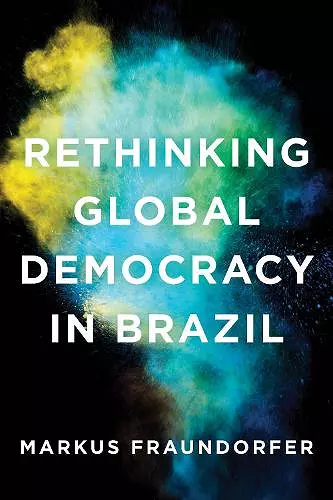Rethinking Global Democracy in Brazil
Format:Hardback
Publisher:Rowman & Littlefield International
Published:8th Nov '17
Currently unavailable, and unfortunately no date known when it will be back
This hardback is available in another edition too:
- Paperback£41.00(9781786604545)

In recent years, a growing literature has focused on how to create more effective and democratic global governance mechanisms to better tackle global challenges such as health epidemics, global hunger, Internet surveillance or the consequences of climate change. Yet there is a gap in accessible published material to reflect contributions of democratic states from the global South. Among these democracies from the global South, Brazil is a popular case for teachers and researchers looking to study global governance mechanisms. This book provides students with a framework that challenges the Western-centred views on questions of how to democratise global governance processes, arguing that developing democracies from the global South have developed serious and sustainable approaches to a more democratic global system. With chapters on Brazil’s responses to global food security, the purchase of drugs, open government initiatives and internet governance, this book opens up contemporary and novel practices of democracy for examination.
In Rethinking Global Democracy in Brazil, Fraundorfer finds reasons for hope that multilateral institutions will do a better and more evenhanded job at tackling pressing global problems by sharing power with civil society organizations and affected local communities. Fraundorfer closely examines four recent cases in which such interactions took place, all involving Brazil: the development of the World Health Organization–backed international drug purchase facility called Unitaid; the promulgation of rights-based doctrines by the UN’s Committee on World Food Security; the establishment of the eight-nation pro-transparency Open Government Partnership; and the NETmundial global meeting, a one-off effort to advance ethical Internet governance. During the reign of Lula’s Workers’ Party, Brazil served as a fascinating laboratory for these democracy-expanding innovations. Brazilian representatives, including Amorim, possessed the expertise and credibility to play leading roles in all four international exercises. To his credit, Fraundorfer recognizes that such experiments are extremely fragile, typically entail only voluntary commitments, produce more doctrinal posturing than policy implementation, and depend on the goodwill of progressive governments—which is currently in short supply. * Foreign Affairs *
What I appreciate most about Fraundorfer’s new book is his genuine commitment with the proposal of offering to readers a non-Eurocentric account of democratic global governance, learning from a host of political experiments in Brazil – one of the largest laboratories for public policies in the global South – some innovative lessons that can meaningfully apply to other communities around the globe. -- Dawisson Belém Lopes, Professor of International and Comparative Politics, Federal University of Minas Gerais (UFMG), Brazil
This important book offers novel assessments of contributions from Brazil and Brazilians towards more democratic global governance. Experiences in four issue-areas show that innovative initiatives from rising actors in world politics can help to give valuable concrete form to ‘global democracy’. -- Jan Aart Scholte, Professor of Global Studies, University of Gothenburg
Markus Fraundorfer examines democracy at the intersection of Brazilian and global politics. The book illuminates how the national and global are enmeshed and how a vibrant democracy depends on a process of democratization in both arenas. This is a consistently illuminating and powerful narrative that will enhance how we understand contemporary politics, the intersections of the national and global, and how we can advance a fair and democratic public domain. -- David Held, Professor of Politics and International Relations, Durham University
An engaging analysis of Brazil’s growing international role and impact. The fascinating cases presented underscore the importance of the Global South as a source of innovative policy ideas and forms of governance, with the potential to help democratize global governance and tackle pressing global problems. This is essential reading for anyone interested in how rising powers from the Global South are transforming global governance. -- Kristen Hopewell, Senior Lecturer in International Political Economy, University of Edinburgh
ISBN: 9781786604538
Dimensions: 236mm x 159mm x 22mm
Weight: 490g
250 pages